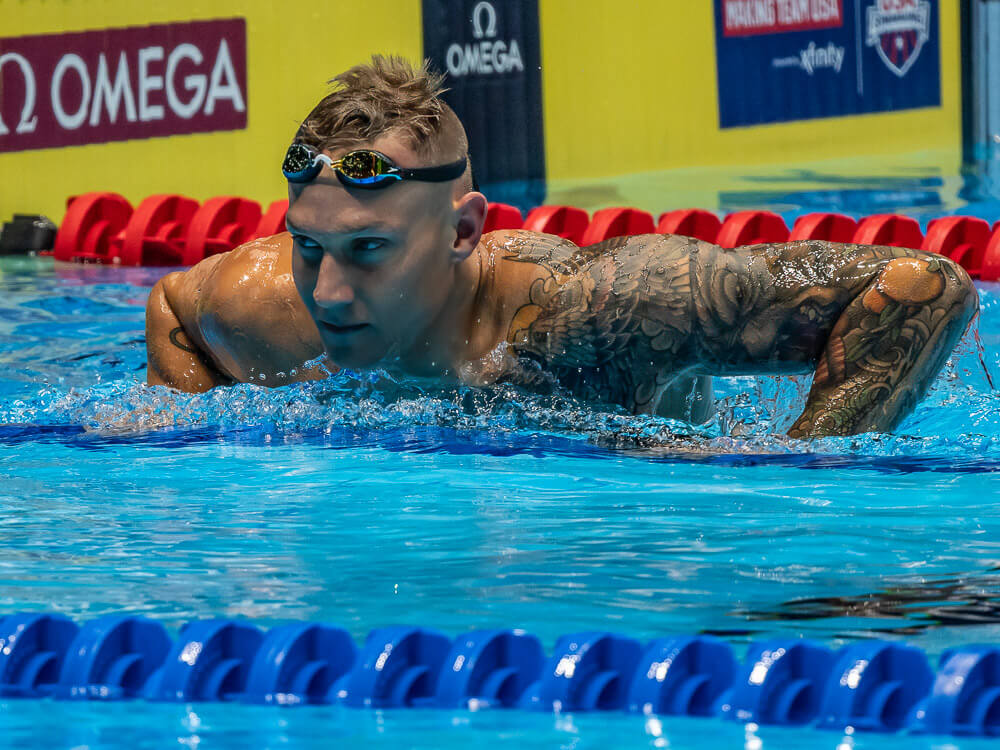Olympic Swimming Top Races, No. 5: Caeleb Dressel Trying to Return to Gold-Medal Form in 100 Butterfly
The Olympic swimming competition will begin Saturday, July 27, with the best swimmers in the world competing for medals in 28 individual races and seven relays over nine days of competition. Before that, Swimming World will count down the top-10 most anticipated races of the Games, where we can expect to find the best races and where the most decorated athletes will be racing for history.
As Caeleb Dressel pursued Olympic gold in the 100 butterfly three years ago in Tokyo, he got a push in the closing meters from Hungary’s Kristof Milak. Dressel got to the wall in 49.45, setting a new world record, while Milak came in for silver at 49.68, moving ahead of Michael Phelps and Milorad Cavic as the second-fastest man in history.
Since that race, no man has clocked a performance under 50 seconds, but plenty have been on the verge of that barrier. Going back to last year’s World Championships final, six men have posted times between 50.0 and 50.5, setting up an extremely competitive fight for gold in Paris.
Last year’s World Championship final marked the first major final since the 2016 Olympics without either Dressel or Milak present, with Dressel still on the comeback trail after an eight-month hiatus from the sport and Milak missing the meet with health concerns. In their absence, the winner was France’s Maxime Grousset, who clocked a time of 50.14 to edge out Canada’s Josh Liendo by two tenths. Grousset looks like his country’s best hope of winning a gold medal in swimming at the upcoming Games outside of Leon Marchand.
Josh Liendo — Photo Courtesy: Michael P. Hall/Swimming Canada
That performance moved Grousset to No. 5 all-time in the event, but Liendo has since knocked him from that perch. Following an impressive performance at the NCAA Championships in which he won three individual titles and helped the Florida Gators to a pair of relay wins, Liendo clocked 50.06 at the Canadian Olympic Trials to put himself on the verge of 49.
Switzerland’s Noe Ponti, the bronze medalist behind Dressel and Milak in Tokyo, clocked 50.16 in April for a national record and the No. 2 spot in the 2024 world rankings. Right behind him is Dressel, who pulled away from a tough domestic field to win the 100 fly at U.S. Olympic Trials in 50.19, his fastest performance since 2021. Australia’s Matt Temple has become a consistent presence in this event in recent years, and his best time of 50.25 from December sits No. 8 all-time.
We should not count out Milak, who has been impressive during the past few months of in-season racing. He recently captured the European title in this event and owns a season-best of 50.75. His countryman Hubert Kos, better known for his achievements in backstroke and the 200 IM, might also get involved in the 100 fly, having been sub-51 twice this year. The biggest name absent from the Paris field will be Dare Rose, the American who won bronze in the event at last year’s Worlds. Rose ended up third at the U.S. Olympic Trials, four hundredths behind Thomas Heilman.
Traditionally in this event, Dressel has blasted out ahead of the field and held on down the stretch; on his way to a world record in Tokyo, he went out in 23.00 and returned in 26.45, compared to splits of 23.65 and 26.03 for Milak in his silver-medal-winning effort. At the U.S. Trials last month, Dressel’s opening speed was well off his best split at 23.53, but he was plenty strong on the way back at 26.66, significantly quicker than either Grousset or Liendo swam on the way to their respective best times.
While Dressel will be part of multiple gold-medal-contending U.S. relays at his third Olympics, the 100 fly marks by far his best chance at winning another individual gold. Unlike in Tokyo, when he led wire-to-wire in all three of his individual finals, Dressel might need to chase down his rivals to pull this one off.

